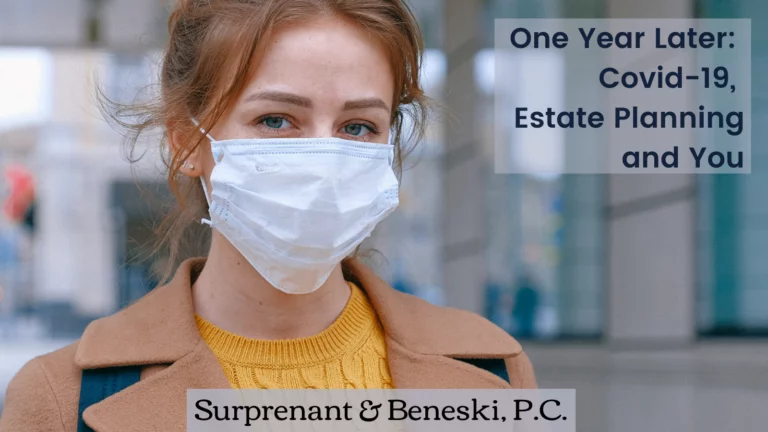
By Attorney Michelle D. Beneski, Esq., CELA, LLM Taxation
Living through the last year with Covid-19, everyone has emerged with their own takeaways. In our field of estate planning & elder law, our learnings underscore what we have been sharing all along:
- Everyone needs foundational documents and waiting to have them prepared can be detrimental when faced with the unexpected.
- Foundational Documents are the base of a strong estate plan that will work as you intended when the time comes.
Here are the key legal documents we refer to as the foundational documents. Note that 4 out of the 5 are meant to help you while you are living.:
- Health Care Proxy
- Authorizes someone you trust to make medical decisions in case of a serious medical emergency, incapacity.
- HIPAA Authorization
- A HIPAA Authorization allows named individuals to have access to your private, protected medical information. This helps facilitate conversations with physicians, insurance companies, pharmacies, etc..
- Advanced Directive
- Documents your medical wishes in case you’re incapacitated and can’t communicate
- Durable Power of Attorney
- Ensures that your family has access to your finances to pay bills, medical expenses, and apply for benefits/insurance. Also, helps with individually-owned accounts. For example, being able to initiate distributions from 401k accounts.
- Last Will & Testament
- Personal property distributions including gifts to family, trusts and any donations.
- Provisions for minor children, children with special needs and pets.
- Identifies the personal representative (and an alternate) who shall manage your affairs.
Common issues families face when a loved one is incapacitated without the right estate planning documents (foundational documents) in place:
- No power to make medical decisions on your behalf if you are unable to communicate your medical wishes
- Family infighting and stress over what medical decisions should be made for you because your wishes weren’t documented
- Inability to access your bank accounts to pay the bills
- Without power to protect assets
- No legal authority to write checks on your behalf or apply for medical insurance/benefits to pay for your hospital stay
- Without the correct documents in place, your family will have to go to court in order to get the legal authority to make your medical and financial decisions if you can no longer make them yourself
Let’s look at some scenarios where the foundational documents are useful:
- Young or old? It doesn’t matter. We learned that Covid-19 does not discriminate based on age. While the elderly are more vulnerable, no one is immune. So, stop thinking a sudden illness or tragedy can’t ever happen to you or that you are too young for estate planning. Illness and /or incapacity can happen to anyone. At that point, who do you want to make decisions regarding your health or your finances? If you do not have a plan in place, the courts will decide. That’s why a Health Care Proxy, a Durable Power of Attorney and an Advanced Directive are so important.
- You don’t need to be exceptionally rich to have an estate plan. In fact, you don’t need to own anything! Estate planning should begin the moment your child turns 18 because that is when they become a legal adult. Should incapacitation happen to them, the medical community, or an institution of higher learning, legally cannot speak to you because of privacy laws. An easy fix is to have a Health Care Proxy and a HIPAA authorization.
- Just because you know what kind of care or measures you want (or don’t want) and you told your sister, doesn’t mean it is legal or binding. This is where an Advanced Directive, sometimes called a Living Will, comes into play.
- What happens should you pass? Do you want the court to decide who gets what? That is, if there is anything left after probate costs. That’s what happens if you die without a Last Will & Testament.
- For those that have done their estate planning, Covid-19 is a good reminder to review their planning. Many times, a plan is reflective of where your life was 10 years ago, but what about now? Did you include your new grandchildren? Do you have an ex- spouse or an ex- in-law that you don’t want to have control or benefit from your estate? No time like the present to update that plan.
The two final points that our experience with Covid-19 has driven home are:
- We cannot control everything but the things that we can control, we should.
- Procrastination can end in disastrous results.
Think of estate planning as a vaccine for future problems that could negatively impact you and your loved ones. In-person appointments are so 2019. For your health and safety, virtual appointments are just as productive as in person meetings and for some, less intimidating.
©Surprenant & Beneski, P.C. 35 Arnold Street, New Bedford, MA 02740, 336 South Street, Hyannis MA 02601 and 45 Bristol Drive, Easton MA 02375. This article is for illustration purposes only. This handout does not constitute legal advice. There is no attorney/client relationship created with Surprenant & Beneski, P.C. by this article. DO NOT make decisions based upon information in this handout. Every family is unique and legal advice can only be given after an individual consultation with an elder law attorney. Any decisions made without proper legal advice may cause significant legal and financial problems.
